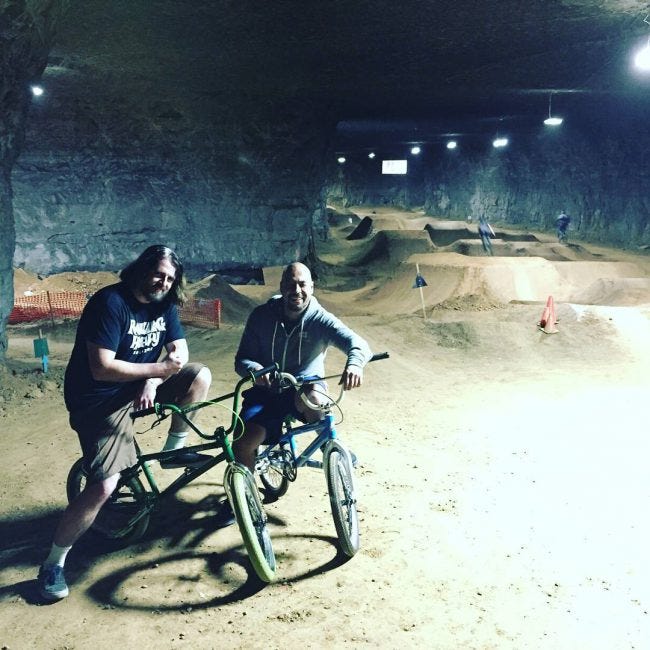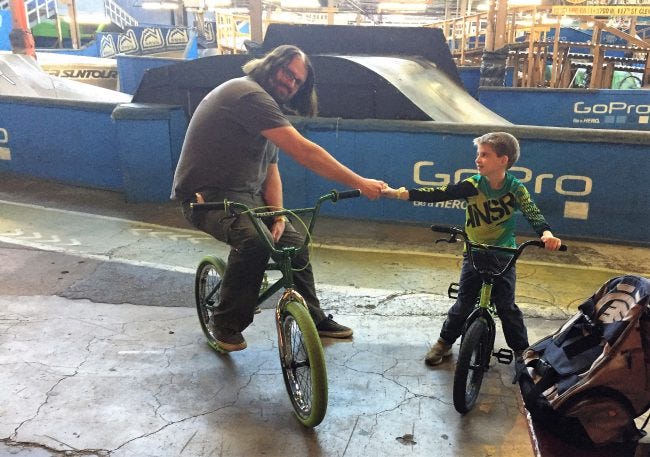Still They Ride

"So if Nick hadn't died," my son said as I raised his leg off the bench at Ray's and slipped on the ankle guard, "then it would have been me, you, and him here today. But now, it's just us."
"That's right," I replied.
"But he would want us to ride here anyway."
"Yes."
Slightly after seven last Saturday morning, my old friend Martin pulled up in his new 340i six-speed. Seventeen years ago, he arrived here from Bolivia to race and train in Ohio. I predicted that he would never leave, and I was right. At one point or another, we've been roommates, training partners, and co-workers. More than that, we've been friends. He knew Nick and raced with him. The plan was for us to attend the funeral in Kentucky and then ride the underground BMX trails at the Mega Cavern in Louisville.
I was prepared to see Nick's coffin but I was not prepared to see his two S&M Speedwagon bikes, the twenty-inch and the cruiser, on both sides of it. I'd given him a hard time about those bikes; I thought it was willful anachronism on his part to have a pair of custom steel frames built instead of doing something modern. Yet he won with them, right down to the last race before his death, some thirty days ago. We sat on chairs that were seemingly designed to be uncomfortable and I was angry with myself for noticing.
My ex-wife had gone to the viewing the night before; she'd told me there were hundreds of people lined up. At the service, I counted fifteen rows of twelve chairs, most of them filled half an hour before the service began, and standing room only behind. His wife, daughters, and son spoke to everyone afterwards. I thought about the sheer unbridled misery involved in that. About each and every person wanting a private, personalized conversation about your dead husband or father. About the hunger that each one of us had to be included in their moment. At that moment I felt like a vicious narcissist for having attended, for wanting a moment of my own with the family. I resolved to just stand up and walk out without bothering them --- but when the time came I was just as weak-willed as everybody else. I lined up for my benediction and received it, regardless of the cost someone else paid to give it.
The misery of that receiving line. How many times can you hear that somebody was the best friend, the greatest racer, the kindest man they'd ever met? What does that do to you? What about all the private resentments and anger that you have about that person? How does that receiving line not come across as a weapons-grade repudiation of how you feel, a negation of your right to be angry? If everybody tells you that your family member was a saint? Who has the right to be angry with a saint? But wasn't Nick too old to be training at that level, riding at that level? At what point do you owe more to the people around you than you owe to yourself?
My own dad regularly reads me the riot act about racing, about riding motorcycles on the street. "You should measure what you get out of it against what will happen if your son grows up without a father." The only response I can ever give him is that maybe it's worse to have a father who gave up on who he was just to be amorphously present. That if I stop doing the things that animate me then I'm just a placeholder for John. And what's the point of being just another overweight suburban dad issuing directives from a worn-down spot in front of the television? How is that useful to my son? At that point I'm just a commodity. Millions of us in this country: lonely, useless men, marking out the end of our allotted days in the darkness of shuttered windows. Our faces lit up with the sickly LED glow. Microsoft Excel by day and Netflix by night.
At the Mega Cavern I walked up to buy the tickets and two twenty-something mountain bikers commented on the fact that I was wearing a suit. I snapped at them to the point that they both kind of wilted. Then I felt even worse. I wadded up the Super 180s Canali three-button, the delicate patterns woven monochrome and textured into background, the funeral outfit of somebody so deeply self-involved that they can't even bear to be seen in a plain black suit. Tossed it all into the BMW. Then it was time to ride.

I hadn't ridden trails since '04. It wasn't easy to get back into the swing of things, particularly on a bike I'd built from scratch the night before in a kind of fevered, distracted rush. But in the end it was Martin who bailed, trying a bigger boost on a fifteen-foot gap and landing leaned over, scraping the finish off his helmet in a three-pronged scar, embedding a rock in his elbow.
Then another kid went down hard enough to need help. Danger Girl was there and she recognized the signs of a concussion. Blood in the eyes, a cheap helmet pushed back by the impact. "I'm fine," the kid told me, with the dead voice that typically comes from drug addicts.
We drove home and we talked about Nick, about our memories. Made calls to Bolivia, talked to our friends. Made plans for the World Championships. Then we picked up John at his mom's house and, after Martin left, we tucked in for the night.
Sunday we went to Ray's MTB park in Cleveland. It's this fascinating labyrinth, everything you could imagine, an old factory packed to the gills with obstacles both terrifying and mundane. At one point I got separated from John and DG. I was lost on the trails for fifteen minutes. Rode a long suspended skywalk that dipped two stories then a step-up jump that rattled my teeth. Finally found my way back to my son, who was winding through a series of wooden humps and slatted, banked walls.
Over three hours, as I watched my son vibrate with joy at discovering and conquering two dozen different paths and jumps, I felt the bike coming back to me. The old motions, the old understanding. It's more than driving a car. You need the same delicacy of touch but there has to be force and strength behind it. Those qualities are sorely lacking in my modern self but I managed to jump a few hip boxes, cross-up past the seat, nose myself down. Every bone and muscle in my body hurt when I called time. John was furious.

"I want to come back right away," he said. "We should bring Martin."
"He'll come next time, I promise."
"I wish Nick could have come," John said. I looked out the window of the Tahoe and waited for the cheerful voice, the adult voice, the one you give to children so they don't catch the forest fire of fear from the careless spark in your own words, to arrive for me.

